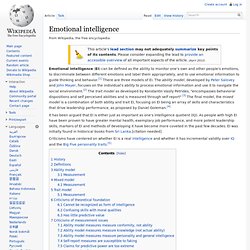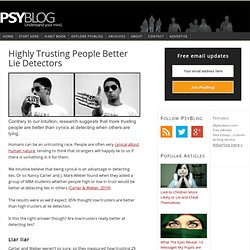

Emotional intelligence. Emotional intelligence. Emotional intelligence (EI) can be defined as the ability to monitor one's own and other people's emotions, to discriminate between different emotions and label them appropriately, and to use emotional information to guide thinking and behavior.[1] There are three models of EI.

The ability model, developed by Peter Salovey and John Mayer, focuses on the individual's ability to process emotional information and use it to navigate the social environment.[2] The trait model as developed by Konstantin Vasily Petrides, "encompasses behavioral dispositions and self perceived abilities and is measured through self report" [3] The final model, the mixed model is a combination of both ability and trait EI, focusing on EI being an array of skills and characteristics that drive leadership performance, as proposed by Daniel Goleman.[4] It has been argued that EI is either just as important as one's intelligence quotient (IQ).
History[edit] Definitions[edit] Ability model[edit] Measurement[edit] Highly Trusting People Better Lie Detectors. Contrary to our intuition, research suggests that more trusting people are better than cynics at detecting when others are lying.

Humans can be an untrusting race. People are often very cynical about human nature, tending to think that strangers will happily lie to us if there is something in it for them. We intuitive believe that being cynical is an advantage in detecting lies. Or so Nancy Carter and J. Mark Weber found when they asked a group of MBA students whether people high or low in trust would be better at detecting lies in others (Carter & Weber, 2010). The results were as we’d expect: 85% thought low trusters are better than high trusters at lie detection. Is this the right answer though? Liar liar Carter and Weber weren’t so sure, so they measured how trusting 29 participants were and had them watch videos of a staged job interview. In these videos, interviewees had been told to do their best to get the job, but half were told to tell three lies in the process.
What is going on? How to Detect Lies - body language, reactions, speech patterns. Interesting Info -> Lying Index -> How to Detect Lies Become a Human Lie Detector (Part 1) Warning: sometimes ignorance is bliss.

After gaining this knowledge, you may be hurt when it is obvious that someone is lying to you. The following deception detection techniques are used by police, forensic psychologists, security experts and other investigators. Introduction to Detecting Lies: This knowledge is also useful for managers, employers, and for anyone to use in everyday situations where telling the truth from a lie can help prevent you from being a victim of fraud/scams and other deceptions. This is just a basic run down of physical (body language) gestures and verbal cues that may indicate someone is being untruthful. If you got here from somewhere else, be sure to check out our Lie Detection index page for more info including new research in the field of forensic psychology. Signs of Deception: Body Language of Lies: • A person who is lying to you will avoid making eye contact.
Bored?
Stenaz.